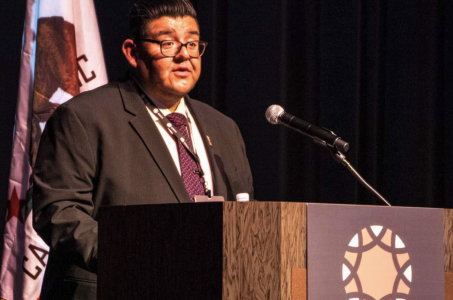California Sports Betting Update: What to Know About Prop 26 and Prop 27
Posted on: July 2, 2022, 02:34h.
Last updated on: July 2, 2022, 06:17h.
California’s Secretary of State announced Friday the proposition numbers for measures voters will decide in November’s general election. Two of those initiatives are proposed constitutional amendments to legalize sports betting, and those items were numbered back-to-back.

That means, depending on the layout of the ballot, the proposal to legalize retail sportsbooks at tribal casinos and state-licensed racetracks, now known as Proposition 26, will likely be next to the amendment to legalize online sports betting statewide, now known as Proposition 27.
Groups affiliated with the tribal gaming measure told Casino.org Friday that that was expected. The Secretary of State gives constitutional amendment questions lower numbers than other citizen-driven ballot initiatives, and measures that qualify earlier – the tribal gaming measure qualified in May 2021 – get the lower number.
The online betting proposal cleared earlier this week, just ahead of the deadline to get on the ballot for the Nov. 8 election.
Kathy Fairbanks, a spokesperson for the tribal-backed “Coalition for Safe, Responsible Gaming,” said it likely will make it easier for voters to have both measures beside each other on the ballot.
What will be confusing for voters will be remembering which one is in person and which one is online, but both campaigns will make that clear in our education efforts,” Fairbanks told Casino.org. “And it will be clearer still when voters read the ballot pamphlet and their actual ballot which includes a description.”
The pamphlet will also be available online at the Secretary of State’s website ahead of the election.
Prop 26 vs. Prop 27
Here’s a quick reset on what both measures include.
Prop 26 would allow retail sportsbooks for in-person wagering at California’s tribal casinos and the state’s four thoroughbred racetracks. Sportsbooks at racetracks would have their revenues taxed at 10%. The measure also would allow tribal casinos to offer roulette and dice-based table games. There’s also a provision within the amendment that would allow anyone to file a civil lawsuit against an entity allegedly conducting illegal gaming activity if the state’s attorney general does not take action.
Prop 27 would allow sports betting statewide through online sportsbooks and mobile apps. Sportsbook revenues would be taxed at 10%, with 85% of the funding going to fund homelessness and mental health services. The remainder would go toward economic development for non-gaming tribes. Commercial sportsbooks must meet certain criteria in order to qualify for licenses that cost $100 million each. Gaming tribes can also take part in online sports betting for $10 million. But they will be limited in how they can brand their operations.
State government analysis of both measures found that Prop 26 would generate revenues “potentially reaching the low tens of millions” for the state on an annual basis. Prop 27, meanwhile, would generate revenues “potentially reaching in the mid-hundreds of millions” annually.
Both limit sports betting to adults aged 21 and older.
While Prop 27 does offer tribes access to online wagering, tribal gaming leaders have come out strongly against the measure. They criticize the online operators as out-of-state interests, and they claim that Californians trust them to manage gaming more than commercial businesses.
Millions Already Raised for Campaigns
Although there are two sports betting measures on the ballot, there are actually four political committees that have been set up in response to the measures. According to records from the Secretary of State’s office, the four groups have already raised $183.8 million to promote or oppose a specific ballot initiative.
Given there are four months left before the election, odds are pretty good that the sports betting measures will break the state record for the cost of a political initiative. According to KQED, the current mark is $224 million, which was spent two years ago on Prop 22, which sought to exempt such companies as Uber and Lyft from state labor law.
Key Players in California Sports Betting
Here’s a rundown on each of the committees.
The “Coalition for Safe, Responsible Gaming,” supports Prop 26. It’s raised more than $19 million to date. The bulk of that money has come from the Agua Caliente Band of Cahuilla Indians, Barona Band of Mission Indians, and Yocha Dehe Winutn Nation. Each of them has contributed more than $5 million apiece.
The other tribal-backed group is “Californians for Tribal Sovereignty and Safe Gaming,” which is mustering its efforts against Prop 27. It released an ad earlier this week focusing on comments DraftKings CEO Jason Robins said at an investors’ conference last month. It has raised more than $35 million, with the San Manuel Band of Mission Indians putting up $25 million, and the Rincon Band of Luiseno Mission Indians contributing $10 million.
Seven sports betting operators have come together to form “Californians for Solutions to Homelessness and Mental Health Support,” a pro-Prop 27 group. It has more than $100 million in its coffers, with BetMGM, DraftKings, and FanDuel each contributing $16.7 million. BallyBET, Barstool Sportsbook, Fanatics Sportsbook, and WynnBet each have given $12.5 to the organization. Earlier this week, the group dropped commercials from small tribal nations that support its proposal.
The final group is “Taxpayers Against Special Interest Monopolies,” which is an anti-Prop 26 organization funded by cardroom casinos in the state. It has raised $29.8 million from several cardrooms, and $9 million of that has come from the Commerce Casino near Los Angeles.
Cardrooms tried to launch their own sports betting petition, but it did not get enough signatures. The group and its supporters have raised concerns about the non-sports betting parts of Prop 26, and what impact that might have on cardrooms and the communities where they’re based.
Related News Articles
Most Popular
FTC: Casino Resort Fees Must Be Included in Upfront Hotel Rates
Genovese Capo Sentenced for Illegal Gambling on Long Island
NBA Referees Expose Sports Betting Abuse Following Steve Kerr Meltdown
UPDATE: Former Resorts World & MGM Grand Prez Loses Gaming License
Most Commented
-
UPDATE: Whiskey Pete’s Casino Near Las Vegas Closes
— December 20, 2024 — 30 Comments -
Caesars Virginia in Danville Now Accepting Hotel Room Reservations
— November 27, 2024 — 9 Comments -
UPDATE: Former Resorts World & MGM Grand Prez Loses Gaming License
— December 19, 2024 — 8 Comments -
FTC: Casino Resort Fees Must Be Included in Upfront Hotel Rates
— December 17, 2024 — 7 Comments
















Last Comments ( 10 )
Which states have prohibited vaccination mandates? These requireds have actually caused job losses for an extremely little portion. Spruce up your small talk with the newest technology news, reviews and products.
And Trump reportedly charges British Prime Minister Boris Johnson of "dishonesty" in a heated phone telephone call about Huawei 5G decision.
Yeah we all know how these helping the homeless organzations work! example 100 million dollars that was to be used to help the homeless after all the contracting, planning and people working on the plan. what was left for the homeless less than 200k explain that..what a waste. So dont use that as a tool.THat has left a bitter taste .
The choice looks clear. Allowing rampant online betting would be a bad idea. It is being presented as a solution to homelessness and disadvantaged tribes. This is disingenuous as online betting will not solve the problem, nor should it. They claim that it will be regulated and restricted, but betting online is a problem in itself as it opens up the floodgates to rampant wagering by anyone. An adult can enable minors to play online... possibly for a fee? They will try to regulate, but online accounts are so easy for anyone to set up. Having unlimited 24 hour access to gambling from a computer will cause massive damage. Imagine people gambling while they are at work, while driving or in school !! At the very least, prop 26 makes this wagering an in person event. People are screened upon entry, and have to actually make the conscious decision to travel to go and play. It is then controlled by already strictly regulated entities that are designed for gaming enjoyment. Minors are not allowed in casinos, plain and simple. Casinos have security measures in place to screen gaming activity by patrons. They also provide resources for problem situations. These facilities also fund community improvements, law enforcement, security services, fire mitigation, and many other benefits at the local level. Keep gaming in legal, regulated and monitored facilities, and ensure that all wagering is regulated and accounted for. Do not allow every cellphone to become a slot machine.
Removing $$$ out of California in the form of gambling profits is crazy. There are already enough ways to lose your money gambling we don’t need more ways making people poorer. Looking at all the money spent on these 2 propositions just show if the Indian tribes really wanted to help their poor and homeless they have the money to do it instead of promoting more gambling. For me it is a NO vote on both of these props. Any money gain to fund homeless from gambling will just give politicians to remove from the state budget and just let them create more programs to fund illegal immigration into California. VOTE NO on both of the props.
One aspect in this Sports betting measures that seems to be ignored in media is the simple question: Which Ballot measure would give Californians the best bet or the best chance of making a successful or winning sports bet? That would probably be Prop 27 because bettors would have both legalized brick and mortar betting as well as internet gambling.
Bill, Prop 27 just authorizes online sports betting. It would not allow brick-and-mortar sportsbooks.
hopefully this doesn't mean they are attempting to try and fool any of these tribes to try to take what little they have left, they have already taken from them before , that's enough already. this isn't fair, learn to appreciate what you have and leave the tribes to their business.
The only thing is Indian reservation casino require good credit score which limited employment. A lot of people don’t have good credit but need a job to support the family. That’s the only thing people don’t like Indian reservation casino coming to town.
just to think of hundreds years ago indian tribes signed treaties to have people go back and break those treaties and kill them and take their land or country know that you something of your own you want to open the door for ne. vada gaming to sneak in and ruin you ,please remember that you can not trust a snake keep your gaming to your tribes and take care of your tribes don"t open that door. over the last hundreds of you should learned .